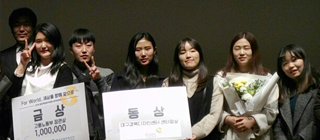-
School of Mechanical Engineering senior Lee Dong-hoon wins 'Local small and medium company R&D industry interns' award Most interns land employment while earning practical work experience High satisfaction in 'employment linked field work' for companies, universities and students [December 23, 2016] The employment-linked field work program pursued by local universities and companies is receiving huge attention from students preparing to graduate. The 'local small and medium company R&D industrial intern project' joined by YU students satisfied both students and companies searching for outstanding human resources and is being evaluated as a successful industry-academic cooperation program. The local small and medium R&D industry intern project' supports industry-academic cooperation between outstanding small and medium companies with universities in order to resolve the mismatch of R&D human resource supply & demand by the Ministry of Trade, Industry and Energy and the Korea Institute for Advancement of Technology. It is an employment-linked long-term field work program that selects industry interns among engineering school students to carry out R&D operations at a company for six months, which can lead to employment. This program is being operated through six consortiums around the nation such as the Daegu-Gyeongbuk region, Seoul-Incheon region, Gyeonggi-Gangwon region, Chungcheong-Sejong region, Honam-Jeju region, and Southeastern region. In the Daegu-Gyeongbuk region, the Gyeongbuk Techno Park and Gyeongbuk Creative Economy Innovation Center, four local universities, Kumoh National Institute of Technology, Catholic University of Daegu), and local outstanding small and medium companies are participating. A total of 55 students are participating as industry interns in 30 companies in the Daegu-Gyeongbuk region. From YU, a total of 11 students are gaining field experience in the second half of 2016 at Korea Powertrain, Sewon Corporation, Sewon ENC, Avaco, Ena Industry, and Samkang. At a recent progress report meeting for this project, YU School of Mechanical Engineering senior Lee Dong-hoon (24, photo, left) took the grand prize after being recognized for his excellent work during his internship at Korea Powertrain. YU students won the grand prize for two consecutive years and most students go on to becoming employed at their respective company, and thus, there is a high level of satisfaction among program participants. Most of the YU student interns this year including Lee Dong-hoon recently confirmed their employment. Lee Dong-hoon said, "I am happy that I received the grand prize and confirmed employment. I am confident that my experience as an intern will help me adapt to the company as a new employee." He added, "The industry intern program is a program where students can learn and gain actual job experience not available for most students. I would recommend other students to also participate in such field-work programs." YU Student Capacity Development Office Director Yoon Sang-heum said, "Rather than just blindly looking to gain employment at conglomerates, it will be more helpful to pick a company you want to go to and gain internship experience to find the company and occupation that fits you." He added, "I hope that students will take full advantage of the various field work programs offered by the school."
-
Swept various awards at Korea's top academic conferences Both undergraduates and graduates concentrating on research Published in SCI journals from undergraduate school and has become a traditional department with 'excellent research power' [November 15, 2016] <Department of Chemistry (undergraduate/graduate) students who have won various awards at Korea's top chemistry-related conferences> (clockwise from bottom-right, Lee Young-hwan, Doh Jung-yeon, Kim Sung-il, Lee Jae-hyung) YU Department of Chemistry students won various awards at Korea's top academic conferences in the chemistry sector, thus being recognized for their research capacities. The research power of YU Department of Chemistry is being highlighted for both undergraduate and graduate school students. Lim Young-hwan (26), who is currently in his master's degree program at the YU Graduate School of Chemistry recently won the 'Daerim Grduate School Paper Award' recently at the '2016 KICHE (Korean Institute of Chemical Engineers) Fall Academic Conference'. KICHE is Korea's top chemical engineering society with over 5,000 members. Mr. Kim won the grand prize with his research on 'performance evaluation of zinc-nickel flow cells'. Doh Jeong-yeon (25) also in a master's degree program recently won the 'Young Researcher Award' at the '2016 KICHE Fall Academic Conference' held recently at the Jeju Convention Center. The 'Young Researcher Award' is an award given to young and promising female science and technology professionals by the Korean Society of Industrial and Engineering Chemistry and the Center for Women in Science, Engineering and Technology to encourage the passion of female science technicians and continued R&D. This is the second award winner from YU since Kang So-ra (2nd term in master's degree program at the time) who won the award in 2014. Doh also won the best paper presentation award at an academic conference hosted by KICHE earlier this year and won various awards in major chemistry-related academic conferences, thus being recognized for her capacities as a promising young scientist. Undergraduate students have also been keeping up the pace. Kim Sung-il (25) and Lee Jae-hyung (24), who are both seniors in the Department of Chemistry, both won the 'outstanding paper presentation award' at the '2016 KICHE Fall Academic Conference', showing off the research capacities of undergraduate students. Lee Jae-hyung published his research results on developing catalyst materials earlier this year in the SCI journal Materials Letters (impact factor (IF) 2.437) in the applied physics sector. They are all part of the YU Department of Chemistry mineral nano-new material class (Advisor Kang Mi-sook). They all agreed on the reason for their recognition in research capacities by Korea's top academic organization saying that it was the "result of continuously engaging in research with graduate school students." Students of the research center have been putting out excellent research results such as publishing papers in SCI journals every year even from their undergraduate studies. Furthermore, YU students were also awarded for four straight years from 2013 the 'Graduate School Catalyst Research Award' that is given to graduate school students with excellent research achievements every year by KICHE. Doh Jeong-yeon, who will be graduating from her master's degree program in February, said, "The tradition of our department will continue and be awarded at various conferences as our advisors and students are still working hard on research."
-
-
380 students go abroad for overseas volunteer corps, overseas internships, backpacking, etc. Various programs such as foreign culture exploration, exchange in majors, industry-academic cooperation, etc. [January 6, 2017] <32nd volunteer corps launching ceremony> YU students will travel around the world this winter break. YU students are planning to spend their winter breaks even more busily than during the school term. YU operates various overseas dispatch programs using the break to strengthen the global capacities of students. Over 380 YU students will be traveling around the world this summer break. The 'overseas volunteer corps' participated by over 2,430 students over 31 sessions since 2001 is YU's best-known overseas dispatch program. This winter break, YU will also send its 60 students in its 32nd overseas volunteer corps to Laos, Vietnam and India to do volunteer work. They held a launching ceremony at 3 p.m. on the 4th at the YU College of Education auditorium and will send a total of three teams for two weeks each overseas such as Vietnam on January 8, India on the 11th, and Laos on February 1. The volunteer corps will visit local elementary schools and offer volunteer services for education and environmental improvements. During the volunteer period, they will be engaged not only in improving the educational environment of elementary schools such as repairing old facilities, painting walls, and drawing wall murals, but also provide education in arts and sports such as making soap, jump rope and foot soccer through different education teams in art and physical education, while also spreading Korean culture through Korean language education. The team being sent to Vietnam will team up with around 20 students at the Van Hien University Department of Korean Language for volunteer and cultural exchange. Kim Tae-gon (24, Statistics, Junior), the team leader for the Vietnam Team in the 32nd overseas volunteer corps, said, "I hope that through the various programs in the overseas volunteer corps activities, we will be able to share our experiences and knowledge to learn the true meaning of volunteering." Another one of the most popular program among students among the overseas dispatch programs offered by YU is 'Window To The World'. 'Window To The World' is a very popular program for backpacking in search of a theme related to school. The selected students are offered round-trip airfare. Since first beginning in 2002, over 2,200 students traveled around the world. This winter break, 104 students will make teams of twos and threes to go backpacking all around the world such as Europe, USA, Australia, Japan and China. 'OPP' (Outbound Pilot Program) is another overseas dispatch program that is the pride of YU. This is a preliminary short-term language program for students interested in studying abroad and to participate as exchange students in overseas sister schools. OPP, which began in 2009, was joined by 1,533 students and this winter break, 108 students will be sent to the Philippines for four weeks through OPP. For the overseas internship program where students work at a foreign company for six months to one year, 30 students will be sent to the United States. Students who participate in academic credit programs will be able to kill three birds with one stone such as in gaining overseas experience, work experience, and school credits. In addition, approximately 140 students will go abroad for local start-up training in Shanghai, China, Global Capstone Design project presentation, overseas cultural explorations, short-term overseas internships and foreign language programs, and thus a total of 380 YU students will leave their footprints around the world during this winter break.
-
Significantly lowers decomposing time compared to other catalysts and can decompose with visible raysCan be used repeatedly on difficult-to-decompose waste water treatment and industrial economic effects expected Receiving attention as results of joint research by Korean-Egyptian scientist [January 9, 2017] A new path will be opened for the hard-to-decompose waste water treatment industry. YU Professor Shim Jae-jin's research team successfully developed a nano-structure catalyst without using oxidants and that is recyclable that can decompose over 99% within 30 minutes in both UV rays and visible rays. It is expected to provide epochal contribution in relevant industries in the future. Existing catalysis had problems such as being able to decompose only in UV rays but having difficulties in visible rays, requiring long decomposition time, and having low recycling rates of catalysts. In order to address the weaknesses of such catalysts, Professor Shim's research team successfully developed a catalyst using microwaves that can decompose organic tints even in visible rays by purely synthesizing with graphene-supported silver zinc/iron oxidant nano-complexes. Thde developed catalyst uses microwaves and is a hybrid nano-complex catalyst that applied silver-nanoparticles (10-20nm) and zinc/iron oxidant particles (30-40 nm) using a single self-assembly reaction, and it has a structure with excellent catalyst performance for easy optical pumping electronic-single pair separation and electronic delivery. This catalyst prevents combination of zinc/iron oxidant nanoparticles through interaction with graphene and it has a large surface area (BET surface area 179 m2/g, stoma size 3.6 nm), and can be used in both UV rays and visible rays. Furthermore, the decomposition time is short at 30 minutes and it does not use oxidants (hydrogen peroxide, peroxosulfuric acid, etc.). Furthermore, it not only improves the decomposition efficiency by 100-300% compared to past research, but the catalyst also has magnetic properties, making it easy to recover after use, and the after five uses, the photocatalyst reduction is less than 3%, thus exhibiting significantly high recycling rates. Professor Shim, the principal researcher of this study, said, "The graphene-metal oxidant nano complex that we developed can decompose wastes that are hard to decompose, and it also does not use chemical oxidants, can be used repeatedly, and has hhigh re-use efficiency and short decomposition time. Therefore, it is expected to contribute considerably to industries in the future." He added, "We will continue our research to develop high performing graphene-metal oxidant nano-complex materials by using clean catalysts so that it can be used for energy storing (super capacitors), optical catalysts, chemical sensors, and anti-bacterial bio materials." This study was joined by Dr. Amr Hussein Mady Hussein, a senior researcher in the national oil research center of Egypt, Professor Marjorie Lara Baynosa (PhD at YU) of the University of the Philippines, and Dr. Dirk Tuma of Germany's BAM Federal Materials Testing Center as part of the emerging nation support project (inviting foreign scientists and technicians to Korea) overseen by the National Research Foundation. The research results were included in <Applied Catalysis B: Environmental> citation index 8.328, top percentile 0%) online issue (October 2016) and will be published in an academic journal in April. In the past three years, Professor Shim published 68 nano-material related papers in SCI journals. The excellence of his papers were recognize (h-index 22) by being published in major journals such as <Journal of Power Sources> (2015, citation index 6.333, top percentile 3.7%), <ACS Sustainable Chemistry & Engineering> (October 2016 online issue, citation index 5.267, top 5.92%), <Sensors and Actuators B: Chemical> (2015-2016, 4 papers (including online), citation index 4.758, top percentile 1.78%). Furthermore, based on the research outcomes, he registered 14 patents and is very active as plenary, keynote and invited speakers in over 20 international academic conferences. He has served as the chairman of the Korean Society of Clean Energy (2012) and vice-chairman of the Korean Society for Engineering Education, and is currently working as the YU Industry-Academic Cooperation Team's Clean Energy Research Center Project Leader and the Clean Technology Research Center Director.
-
Brilliant finale of 2016 with best team award, best coach award, and best player award! King of colleges by sweeping four tournaments such as the National Sports Festival, U League, and Fall University Federation Joined K-League while still at school based on excellent skills [December 26, 2016] <The YU football team won the best team award, best coach award and best player award in the '2016 Korea University Football Confederation' awards> (from left to right, Kim Hyun-tae, Lee Sang-gi, Coach Kim Byung-soo, Kim Yoon-soo, Lee Jung-seo) YU ended 2016 by sweeping various awards at the KUFC awards. The YU football team (Coach Kim Byung-soo) not only took home the victory cups from various tournaments this year, but also swept the awards at the annual awards ceremony to make this year the year of YU. At the '2016 KUFC Awards' held at Rivera Hotel in Gangnam-gu, Seoul at 5 p.m. on the 23rd, Coach Kim Byung-soo (46) received the best coach award, and a total of four players such as Kim Hyun-tae (22, senior, School of Kinesiology), Lee Jung-seo (21, junior, School of Kinesiology), Lee Sang-gi (20, sophomore, School of Kinesiology) and Kim Kim Yoon-soo (22, senior, special physical education) received the best player awards. Four of the 16 best players were from YU. The best team award also went to YU. Coach Kim Byung-soo said, "I thank our players for doing their best despite the harsh schedule of playing in numerous tournaments. It is an honor to receive the best coach award thanks to our great players." He added, "I will do my best to continue the golden age of YU football." The YU football team rose to the top of college football by winning four major tournaments this year alone. YU won the gold medal by representing Gyeongbuk in the National Sports Festival held in October, and rose to the top in the '47th National Fall College Football Federation Tournament' in July, the '13th Fall College Football Tournament for Freshmen and Sophomores' in August and swept the '2016 U League' by winning all 12 of its matches. All four of the players who received the best player awards went professional (K League) this year based on their excellent skill level. Kim Hyun-tae joined the Jeonnam Dragons, Kim Yoon-soo joined Seongnam FC, Lee Jung-seo joined Gwangju FC, and Lee Sang-gi joined the Pohang Steelers.
-
Wins Daegu Mayor Award held by the Korea Textile Development InstituteProposed 'alternating array PVA hollow fiber membrane manufacturing' technologies High durability, simple spinning process for wide application in water-treated membranes [January 9, 2017] <YU student Kim Won-seop who won the grand prize at the 2016 College (Graduate) Creative Convergence Textile Idea Contest> Kim Won-seop (24) of the YU Department of Nano, Medical and Polymer Materials won the grand prize at the '2016 college (graduate) creative textile idea contest' held by the Korea Textile Development Institute. This idea contest held by the Korea Textile Development Institute was designed to find the creative ideas of college (graduate) students and utilize it for the development of the textile industry, while providing an opportunity to contribute to the development of the textile industry. This year, the contest received ideas in the corporate support capacity improvement sectors such as new industry and technology and commercialization support for joint growth with other industries through convergence and pioneering new channels for the textile industry and utilizing 6T-based new material and convergence technologies. Ideas were received from September of last year. After the first document reviews and second presentation judging, Kim Won-seop, who proposed the 'alternating array PVA hollow fiber membrane manufacturing' technologies, won the grand prize. This technology received good reviews in that it is an advanced material manufacturing technology that can be applied in the water industry, which is one of the new regional industries, and is both creative and practical. Mr. Kim received a cash prize of 5 million won and will be passed in the document application if he chooses to find employment at the Korea Textile Development Institute. The technology proposed by Mr. Kim uses polymer materials with water-friendly and hydrophobic properties to raise durability and suppress fouling, and is a hollow fiber membrane manufacturing idea that has both improved productivity and lower cost by simplifying the processes. It is expected to be widely applied in various fields such as the medical and electronic materials sectors, in addition to the water treating sector. Mr. Kim, who won the grand prize, said, "Membranes are important materials that are essential in various industrial sectors. At this juncture where membrane demand is increasing rapidly, localization of new materials that maximize filtering effects to procure platform technologies will contribute in the development of high value advanced materials industries." The Korea Textile Development Institute is planning to use ideas from this contest to begin R&D in various methods. Furthermore, Mr. Kim was also selected for the 'Start-up leading university start-up item commercialization' support project of the Small and Medium Business Administration in September 2016 with another one of his creative ideas, and thus received funding amount to 26.7 million won from the SMBA, and is putting spurs to IT-based smart device commercialization.
-
YU and Tonghua Teachers College of China, Chinese Foreign Cooperation in Education, Chinese government approved '2+2 Double Diploma Program' Open YU major course and dispatch professors to national university in China Expected to contribute greatly in attracting excellent international students from China [December 15, 2016] <YU and Tonghua Teachers College of China received approval from the Chinese Ministry of Education to pursue the Chinese Foreign Cooperation in Education program.> YU's education and research capacities were recognized by the Chinese government for its excellence. Recently, YU and the Tonghua Teachers College, a national university of China, signed an MOU and agreed to engage in the 'Chinese Foreign Cooperation in Education' program. The 'Chinese Foreign Cooperation in Education' program is a policy being pursued by the Chinese government to open join curricula between Chinese educational institutes and foreign educational institutes, and to offer joint education programs for Chinese students in China. Only universities that received approval from the Chinese government are allowed to engage in this program. In September, approximately 200 Chinese universities applied for the 'Chinese Foreign Cooperation in Education' program, but only 24 universities were approved from the Chinese Ministry of Education. In particular, 10 universities located in Jilin Province applied, and only Tonghua Teachers College, which agreed to engaged in the 'Chinese Foreign Cooperation in Education' program with YU, received approval. Through this program, dual diplomas between the two universities will be recognized, and thus the YU education program received international recognition for its excellence. For this program, Tonghua Teachers College Vice President Jiang Guo, International Exchange and Cooperation Office Director Lin Lingxia and Department of Food Engineering Dean Xu Jing visited YU on the 14th and discussed detailed operation plans. While meeting with acting YU President Kim Jin-sam, VP Jiang Guo said, "Among the universities that applied for the Chinese Foreign Cooperation in Education program in Jilin Province, only Tonghua Teachers College received approval from the Ministry of Education. This is the recognition of the Chinese government of the world-class education and research capacities of YU." He added, "We hope that exchange will not be limited to food engineering, but spread to other academic fields such as the medical sector." As YU and Tonghua Teachers College engage in the Chinese Foreign Cooperation in Education program for food engineering, plans are being made to specially pick Chinese freshmen who will complete the educational course in September 2017. Students will complete a two-year course at Tonghua Teachers College and a two-year course at YU to complete the '2+2 dual diploma' program. As part of this, part of the YU Department of Food Science and Technology major will be opened at Tonghua Teachers College and YU's Department of Food Science and Technology professors will be dispatched to Tonghua Teachers College to teach Chinese students. Acting YU President Kim Jin-sam said, "Actual international exchange between our universities have begun by opening joint educational programs and diploma programs with the approval of the Chinese Ministry of Education." He added, "Through the Chinese Foreign Cooperation in Education program, it will help attract international students coming to study at YU at their own expense such as completing a diploma program at YU by excellent Chinese students." Tonghua Teachers College is the only four-year university in southeast Jilin Province of China and was founded in 1929. It has 15 colleges and approximately 12,000 students. It was selected as an excellent university by the Ministry of Education's evaluations in 2016 and its strength is in its medical sector.
-
Pioneer of Korean 'edible vaccine' research Only Korean to earn PhD at the Boyce Thompson Institute for Plant Research at Cornell University Significant achievement in research for developing host cells for transformation Also engaged in multi-functional utilization research of horticulture [Electronic newspaper - Korean Scientist, December 5, 2016] http://www.etnews.com/20161202000322 "Due to the characteristics of the research sector, fast changes and development cannot be expected like other technologies and industries like other academic fields for horticulture. However, by integrating basic academics and bio-engineering such as plant physiology and genetics, the value of horticulture crops and agricultural products are rising not only as food ingredients for general consumers, but also for utilization by the medical and industrial sectors." YU Department of Horticulture & Life Science Professor Moon Yong-sun (46) is a pioneer in research on 'edible vaccines' in Korea. Professor Moon earned her PhD at Cornell University, which is especially famous for its research in edible vaccines. The Boyce Thompson Institute for Plant Research at Cornell was the first place to begin edible vaccine research in the United States and Professor Moon is the only Korean who earned a PhD here. Professor Moon, who researched development of edible vaccines at Cornell University from 1996, concentrated on research for acquiring vaccine effects by manifesting specific vaccines at specific times from plant seeds and using it in animal feed. Professor Moon said, "Research on edible vaccines achieved considerable success through 20 years of research since the 1990s. Despite this, there are difficulties in commercialization due to political conditions and issues on understanding by consumers." She added, "R&D has reached a level in which vaccine effects can be manifested by consumption for both animals and humans. First off, by using feed containing vaccines in the poultry industry that uses 100% corn feed, it will help greatly for livestock farms." "In addition, we have the cornerstone for producing orally-administered vaccines that can take the place of vaccine injections by developing transformants that can produce vaccines using bananas and tomatoes." She further added, "It is expected that by providing the basis for manifesting vaccines that can prevent Newcastle disease in chickens only in corn seeds, it will be possible to not only produce vaccines that can be used in poultry and pork farms, while also lower costs for feeds." Professor Moon is also reaping significant achievements in research on developing host cells for transformation (genetically transforming bio specimens or cells through DNA given from the outside) in addition to edible vaccine research. Host cells for transformation mainly used in past studies were microorganisms such as E. coli and agrobacterium, and had issues due to high costs. Due to this, the need to develop new host cells to manifest foreign proteins for transformation was continuously raised. Professor Moon developed a new microorganism host cell that can produce foreign proteins like vaccines by utilizing the pectobacteria, which is a pathogen that can cause soft rots in cabbage and potatoes. Professor Moon's studies suggest new ways to utilize pathogens that can cause diseases in crops, and therefore, it is expected to have significant industrial and economic ripple effects as it will broaden the range of using microorganisms. Professor Moon said, "By providing new pectobacteria host cells for excessive foreign protein manifestation and transformation, it is expected that there will be more options for researchers, and that it will have a cost-saving effect by eliminating the refining stage that is necessary for mass production of foreign proteins such as for vaccines." Professor Moon also said, "I have recently become interested in the functional material analysis, anti-oxidizing and anti-cancer effects of horticultural crops. In order to introduce the western vegetable 'rhubarb' that people eat the stems of like celery in Korea, I am conducting research on the cultivation features and its anti-oxidizing and anti-inflammation effects." She added, "I will make a comparative analysis on the medicinal effects of rheum palmatum (a kind of rhubarb for which its roots are used for medicinal purposes in Asia) to study the various utilization possibilities as horticultural crops such as using the stems for food, roots for medicines, and leaves for disinfection and insecticides."
-
Part of Ministry of Labor's 'Youth Employment Academy', joined by 178 project teams from 21 universities around the nation Created unique and original jobs such as 'Moss Gardener' and 'Slice Room Residential Manager' Profession that enhances uses of plants by integrating textile designs in natural moss wins gold [December 12, 2016] <YU students who won the gold and bronze awards at the 2016 Youth Employment Academy Job Creation Awards> YU students won the gold and bronze awards at the '2016 Youth Employment Academy Creative Awards' with their unique and original creative job items. This contest was organized to share the achievements of job creation by participants of the 'Youth Employment Academy Job Creation Process' hosted by the Ministry of Employment and Labor and the Human Resources Development Service of Korea. A total of 879 people from 178 project teams of 21 universities around the nation participated, and 15 teams made it to the finals held at the Seoul KDB Life Tower Dongji Art Hall on the 6th. After displaying the results of the project activities of each team and holding presentations, Harmony Team comprised of five students at YU's Department of Clothing and Fashion, Department of Horticulture and Life Science, and Department of Philosophy took home the gold prize with their job creation item titled 'Moss Gardener'. Team Heim comprised of students from the Department of Family and Housing Studies won the bronze with their item titled 'Slice Room Residential Manager'. 'Moss Gardener' refers to a person who uses scandia moss, which is a famous natural moss, and textiles to develop and apply various items that can be used in everyday life such as wall ornaments, interior and other goods. Team Heim that won the bronze came up with the job 'Slice Room Residential Manager' who would help residents of slice rooms living in areas that social welfare workers and residential welfare workers have difficulty in helping. Slice room residential managers would engage not only in examining the residential environments, offering services to improve residential areas, and making safety inspections of those in vulnerable residential areas, but also provide emotional support and help with employment activities to improve the overall life of those living in slice rooms. Team leader of Harmony, Park Go-woon (23, YU Department of Horticulture & Life Science, senior), who led the team during the seven month project period, said, "Horticulture had limited uses such as being used only for aesthetics or natural air purifiers such as scandia moss. We wanted to integrate the eco-friendly functional plants with textile designs to make everyday products so that its uses can be expanded." She added, "By linking with the new occupation of 'Moss Gardener', we are even planning on making start-ups. It will be possible to come up with a good start-up item by concretizing and branding the functions and uses of related products and the roles of a moss gardener."
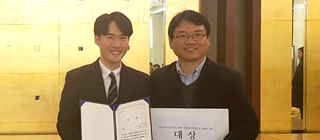
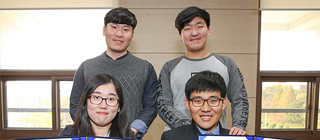
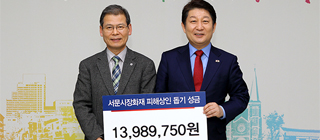
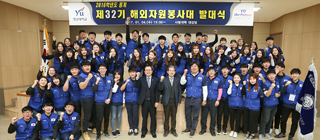
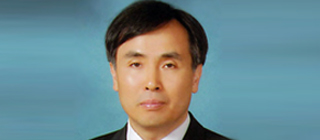
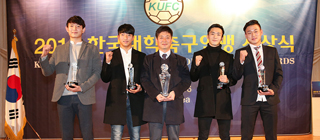


![[Korean Scientist] Department of Horticulture & Life Science Professor Moon Yong-sun](/app/board/attach/image/thumb_33224_1482888937000.do)
